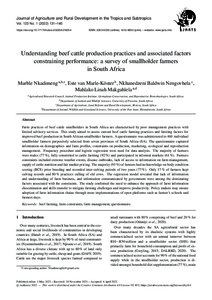| dc.date.accessioned | 2022-05-05T11:03:41Z | |
| dc.date.available | 2022-05-05T11:03:41Z | |
| dc.date.issued | 2022-05-01 | |
| dc.identifier | doi:10.17170/kobra-202204216054 | |
| dc.identifier.uri | http://hdl.handle.net/123456789/13812 | |
| dc.language.iso | eng | eng |
| dc.rights | Namensnennung 4.0 International | * |
| dc.rights.uri | http://creativecommons.org/licenses/by/4.0/ | * |
| dc.subject | beef farming | eng |
| dc.subject | farm constraints | eng |
| dc.subject | farm management | eng |
| dc.subject | questionnaire | eng |
| dc.subject.ddc | 630 | |
| dc.title | Understanding beef cattle production practices and associated factors constraining performance: A survey of smallholder farmers in South Africa | eng |
| dc.type | Aufsatz | |
| dcterms.abstract | Farm practices of beef cattle smallholders in South Africa are characterized by poor management practices with limited advisory services. This study aimed to assess current beef cattle farming practices and limiting factors for improved beef production in South African smallholder farmers. A questionnaire was administered to 460 individual smallholder farmers purposively selected from seven provinces of South Africa (SA). The questionnaire captured information on demographics and farm profiles, constraints on production, marketing, ecological and reproduction management. Frequency procedure and logistic regression were used for data analysis. The majority of farmers were males (77%), fully committed to cattle farming (92%) and participated in informal markets (61%). Farmers constraints included extreme weather events, disease outbreaks, lack of access to information on farm management, supply of cattle nutrition and fair market pricing. The majority (93%) of farmers had no knowledge on body condition scoring (BCS) prior breeding and recorded inter-calving periods of two years (77%). Only 17% of farmers kept calving records and 80% practices culling of old cows. The regression model revealed that lack of information and understanding of farm business, and information communicated by government were among the dominating factors associated with the constraints. The study confirmed the need to enhance the approach of farm information dissemination and skills transfer to mitigate farming challenges and improve productivity. Policy makers may ensure adoption of farm information chains through more implementations of open platforms such as farmer's schools and farmers days. | eng |
| dcterms.accessRights | open access | |
| dcterms.creator | Nkadimeng, Marble | |
| dcterms.creator | Van Marle-Köster, Este | |
| dcterms.creator | Nengovhela, Nkhanedzeni Baldwin | |
| dcterms.creator | Makgahlela, Mahlako Linah | |
| dc.subject.swd | Südafrika | ger |
| dc.subject.swd | Rinderproduktion | ger |
| dc.subject.swd | Rindfleisch | ger |
| dc.subject.swd | Landwirtschaft | ger |
| dc.subject.swd | Beschränkung | ger |
| dc.subject.swd | Landwirtschaftlicher Betrieb | ger |
| dc.subject.swd | Management | ger |
| dc.type.version | publishedVersion | |
| dcterms.source.identifier | eissn:2363-6033 | |
| dcterms.source.issue | No. 1 | |
| dcterms.source.journal | Journal of Agriculture and Rural Development in the Tropics and Subtropics (JARTS) | eng |
| dcterms.source.pageinfo | 131-145 | |
| dcterms.source.volume | Vol. 123 | |
| kup.iskup | false | |


